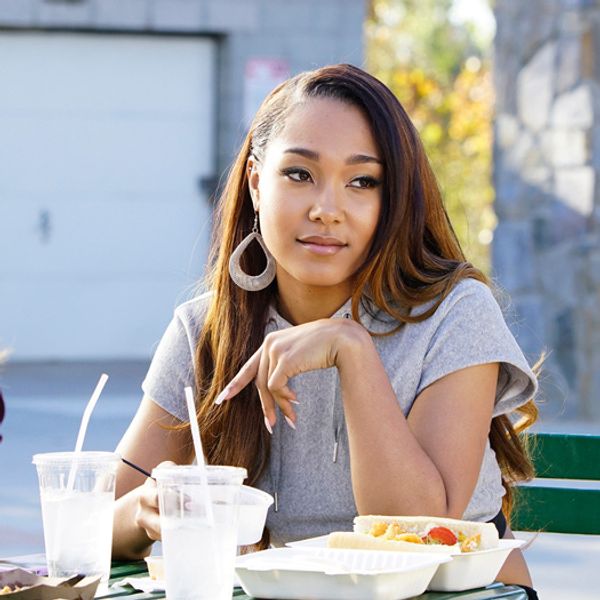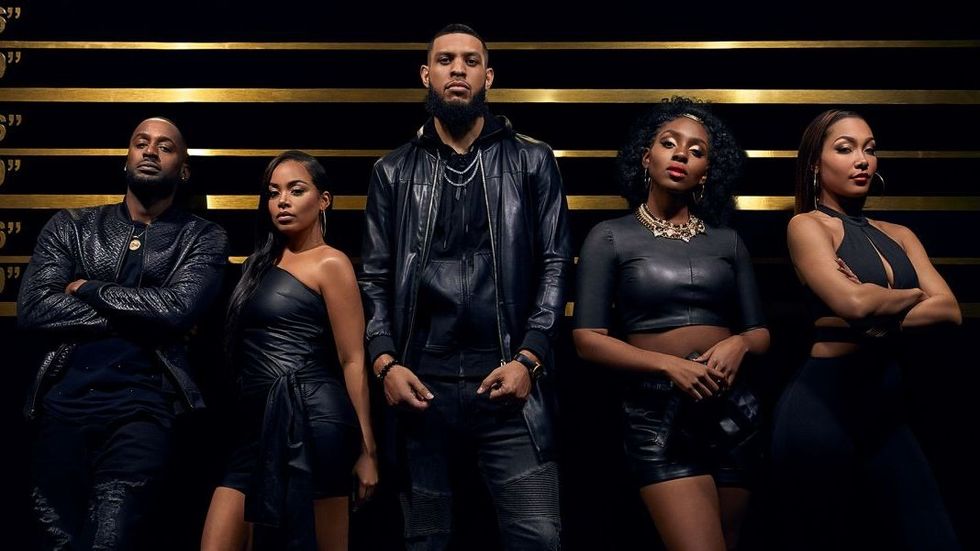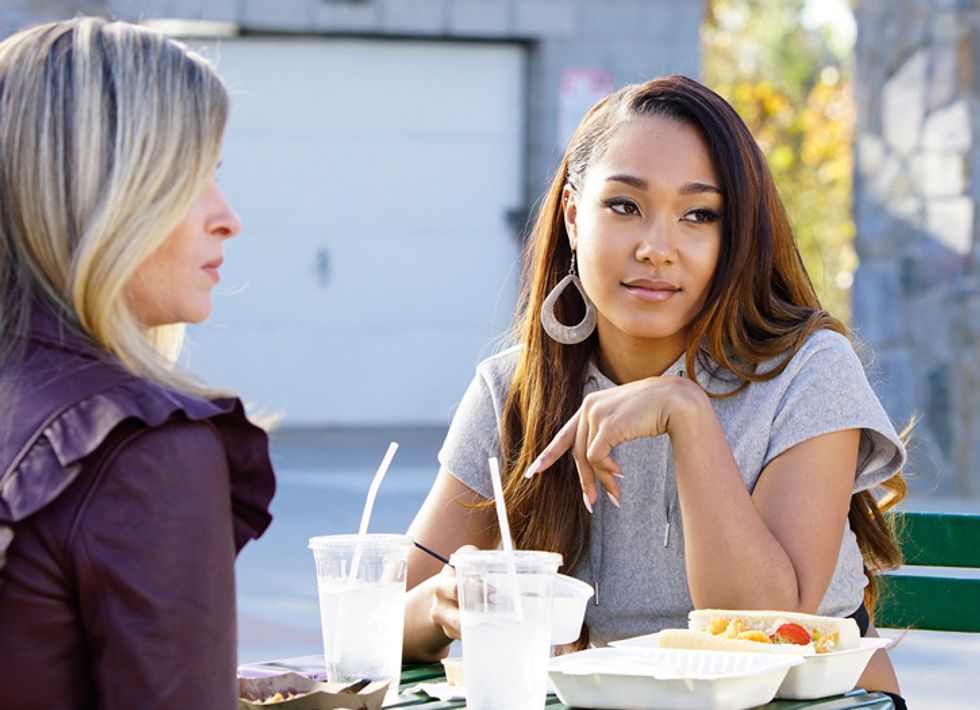Former Child Star Parker McKenna Posey Is Ready To Take The World By Storm

Parker McKenna Posey has come along way since My Wife and Kids. Most affectionately known for her role as little Kady Kyle on the hit ABC primetime show, she now stars as Laila James, the struggling and seductive actress looking to make a name for herself on the new BET hit series Games People Play. And while Parker and Laila differ in the way they go about establishing themselves in the world, it becomes clear as we chat that Parker wasn't exempt from adversity both inside and outside of the industry.
The 23-year-old actress admits during our phone call that the journey to get here has no doubt been filled with both let-downs and lessons alike. Taking the form of an acting hiatus while she finished high school, moving out of town, enduring a toxic relationship, unsuccessful auditions, and even a car breakdown the night before her BET audition--Parker assures me that those hardships weren't and won't ever be in vain.
"There were all these obstacles that were testing me in a way, kind of asking me, 'Do you really want this?'" she tells xoNecole. "So to have my manager call me not too long after and tell me, 'Hey they want you to test,' was such an amazing feeling. It was like a sign like, 'This is what you're supposed to be doing and all your hard work has finally paid off.'"
She continues, "It's definitely been a struggle, but I'm just happy to be back working on something that I'm super proud of being a part of. I love the cast and crew, it's all been really fun."
We got the chance to catch up with Parker where we talked her new show Games People Play, evolution, and why letting go of dead weight is so important, and here's what she had to say.
Describe your role as Laila James in 'Games People Play'.
Parker McKenna Posey: Laila James is an LA girl. She's a struggling actress, which is funny. She finds out that it's not as easy as just being talented or auditioning every other day. She realizes that that may not always get the job done, so she takes matters into her own hands. She kind of uses social media to get followers and views and blackmail in a sense. She just uses it for her own gain and throughout the season she finds that all that glitters isn't gold basically. She likes the attention but I think in the end she sees it's not worth it. I think right now people will love to hate her but by the end, people will come to understand her.

Games People Play/BET
How does it feel to be back on TV screens in this way on a network like BET?
Parker: To be honest, that was another thing that was really important to me coming back on-screen. I wanted to be a part of an all-black ensemble. On top of that, just having the chance to be on this network is amazing. I know BET is trying to make a difference on their network and bring more scripted shows and great projects to their network, so to be a part of that is really amazing. And to have an EP that's a black woman and who's been doing this for over twenty years--I feel like that was just an incredible experience to work with her and to just be in the same room as her. The writers are black and I love that. That was really important to me. To be a part of a project that cares about black excellence, it's really important at this time.
You’ve definitely come a long way from ‘My Wife and Kids’. 2006 to 2019, that’s 13 years, what has life been like for you since then?
Parker: We finished in 2006, so it's definitely been a long, long time… I just put it on hold throughout high school and I just focused on graduating and doing my best in school. I was trying to have the most normal experience possible, and then after that I kind of jumped back into it. I was constantly auditioning and try to figure out what the right fit for me. I was getting offered all these roles that weren't really how I wanted to come back and start off my career.

Parker McKenna Posey as Laila James
Games People Play/BET
"To be a part of a project that cares about black excellence, it's really important at this time."
I can imagine the journey between now and then has been filled with many twists and turns. How were able to stay focused and motivated?
Parker: To be honest, acting was all I've known my whole life, you know? Even after My Wife and Kids wrapped, I did a few plays, I've done so many commercials and I've gotten actually involved with modeling--so this industry is all I've known. It's something I've always been super passionate about and I've seen that if I just never give up, I would eventually get my moment. When you follow other child actresses' lives, it doesn't always end up the best, so I definitely wanted to show up in a positive way--and show that it can definitely be done. If you believe in yourself, you can definitely do it.
The name of the show is called ‘Games People Play’ and we arguably get to see a myriad of games displayed through the lives of all of the characters in various areas. What’s something you feel our generation needs to stop playing games about?
Parker: I'm not sure, I'm glad that there is a character like Laila and even if I wasn't playing her, the fact that there is a character like her--I feel like you can learn some things. I think also because people use social media in a lot of different ways, they should see that it's not all it's cracked up to be. People suffer from depression now because we're constantly comparing our lives to the things we see all day long. So I'm glad that my character is representing our age group and how we sometimes play into the social media game. Because it's kind of sad how we base our lives off of Instagram and likes and stuff like that. It's very real, its not just based off some bullsh-t.
You were in a pretty toxic relationship last year and it was unfortunately very public. How were you able to move forward and get back to the heart of Parker?
Parker: Thankfully, I have a really good family and friends who really care about me and my well-being. I'm a normal person, I don't like to really live my life online. I like to live a private life. Last year was really different for me, I just wasn't myself. And I feel like having a good foundation, writing, reading, hearing from other people's experiences and really surrounding myself with people I could lean on--that helped me. Writing how I feel--that really helped me and praying! I've become so much more spiritual. I've always believed in God and my Dad is an Adventist so we were always at church every Saturday until we were old enough to say no (laughs).
But when you're younger, it's hard to have that relationship with God and really understand. I've gotten so much closer to God, just talking with Him and not really asking for anything but just talking to Him about everything and thanking Him for being alive and for my blessings. I really had to come home and figure out what it was I wanted to do. I had to do some soul-searching and get down to the nitty-gritty of because I kind of lost myself. I had to talk with myself, meditate, hike, I got a trainer, worked out, started eating better. You know, you don't really realize how certain relationships can even affect your outer appearance. So I really needed to focus on myself, not do anything but spend time with ME and get ME back right.
"I really had to come home and figure out what it was I wanted to do. I had to do some soul-searching and get down to the nitty-gritty of because I kind of lost myself."
We often hear a lot of established and older women talking about the importance of letting go of dead weight and baggage. Erykah Badu made a whole song about it. But why would you say it’s important for you and those of us in this generation to do the same?
Parker: I really believe in taking care of yourself and letting go of any negativity. It's important to work on your mental state. You can get so much farther in life by being strong mentally. And that can start by doing something like simply working out, it doesn't always have to mean going to therapy and telling someone all of your problems. But just starting with the inside definitely helps because it shows. If your inside is not right, then your outside is definitely not going to be 100. And you can only pretend for so long before it starts eating at you. So it's necessary to let go of that dead weight and whatever you feel is holding you back.
For more of Parker, follow her on Instagram. Catch her starring as Laila in BET's Games People Play on Tuesdays at 9.
Featured image via BET
This Is How To Keep 'Holiday Season Stress' From Infecting Your Relationship
Hmph. Maybe it’s just me, but it seems like there is something really weird happening in the fall season air (because winter doesn’t officially begin until December 21) that cuddle season is in full swing while break-up season is as well. In fact, did you know that break-ups are so popular during the holiday season that December 11 is deemed Break-Up Day?
The reasons why relationships shift around this time vary; however, I did both roll my eyes and chuckle when I read that a very popular one is because it’s an easy way to get out of getting one’s significant other a Christmas present. SMDH.
Anyway, I personally think that the less shallow folks out here may contemplate calling things “quits” or they at least distance themselves a bit from their partner (and what I’m referring to is serious relationships) due to all of the stress and strain that oftentimes comes with the holidays whether it be financial, familial, due to their tight schedules or something else.
Listen, I would hate for you and your man to miss the fun and happiness of experiencing this time of year, all because you are so overwhelmed or irritated that you can’t really enjoy it. That’s why I have a few practical tips for how to avoid allowing the typical holiday season stress from INFECTING your relationship.
Manage Your Expectations
 Giphy
GiphyUnmanaged expectations. If there is a main reason why the holiday season tends to be so stress-filled for so many people, I’d bet good money that this is the cause. And when you’re in a long-term relationship, expectations can manifest themselves in all sorts of cryptic and/or unexpected ways. You might have relatives who assume that you are going to be with them for Thanksgiving or Christmas when you have other plans in mind. You might be thinking that you are going to spend one amount for presents while your man is thinking something totally different. When it comes to scheduling, your signals may be crossed.
And you know what? To all of these scenarios, this is where clear and consistent communication come in. Don’t assume anything. Don’t dictate anything either. From now until New Year’s, mutually decide to check in once a week, just to make sure that you are both on the same page as it relates to the holidays and what you both are thinking will come along with it. The less blindsided you both feel, the less stressed out you will be. Trust me on this.
Set (and Keep) a Budget
 Giphy
GiphyOkay, so I read that last year, 36 percent of Americans incurred some type of holiday-related debt. Hmph. Last year, there was still some sense of normalcy in this country, chile, so I can only imagine what finances are gonna look like over the next several weeks. That said, since I don’t know a lot of people who don’t find being broke stressful, make sure that you and your bae set a budget and then stick to it this year — no ifs, ands or buts.
Because really, y’all — it doesn’t make sense to deplete savings and/or max out credit cards for a few days of giggles only to be damn near losing your mind because you don’t know how to make ends meet come Dr. Martin Luther King, Jr. Day.
And by the way, this tip doesn’t just speak to things like food and gifts; I also mean travel. If it doesn’t make a ton of sense (or cents) to be all over the place this year — DON’T BE.
Keep Matthew 5:37 at the Forefront
 Giphy
GiphyIf off the top of your head, you don’t know what Matthew 5:37 says, no worries, here ya go: “But let your ‘Yes’ be ‘Yes,’ and your ‘No,’ ‘No.’ For whatever is more than these is from the evil one.” That verse right there? Oh, it’s a boundaries lifesaver! I say that because do you see “maybe” or “I’ll think about it” in there? Nope. LOL. It says that you should tell people “yes” or “no” and leave it at that — and that complements Anne Lamott’s quote, “’No’ is a complete sentence” impeccably well. Yeah, you’ve got to remember that anything beyond a yes or no to a request is privileged information; you don’t owe anyone details or an explanation.
Besides, if you are really honest with yourself, when someone asks you something and you give a “Umm, let me think about it” kind of reply, more times than not, you already know what your answer is going to be — so why not let you both off of the hook? Give your response. Commit to that. And let everyone (including yourself) get on with their lives and schedules.
I promise you that when it comes to those holiday parties, you are pissing more folks off by not RSVP’ing or doing so and not showing up than just saying, “Thank you but not this year” off the rip.
Remember That Your Personal Space Is Privilege Not a Right
 Giphy
GiphyA friend of mine recently bought a new house and invited me over to come see it. He’s a single man with no children, so as I was taking in all of the space that he had, especially as I walked through his finished basement, I joked about relatives coming to live with him. “Hell no” and “absolutely not” were pretty much his immediate responses as he went on to say that some folks even had the nerve to be offended when he told them that he had no intentions on taking DNA in.
Ain’t it wild how people think that your stuff is their right? And yes, that brings me to my next point. Your home is your sanctuary space. If you want to host folks this year — cool. If not, ALSO COOL. Please don’t let folks (family included) guilt you into how they want you to act or even into what they would do if the shoe was on the other foot. You are not them — and as one of my favorite quotes states, “If two people were exactly alike, one of them would be unnecessary.” (A man by the name Larry Dixon said that.)
Hell, my friends? They know that I am good for sending them random things that they need or even want all throughout the year. Coming over to hang out at my pace, though. Uh-uh. Chalk it up to being a card-carrying member of the ambivert club yet I like keeping my living space personal — and I sleep like a baby, each and every night, for feeling that way.
Always remember that your space, your time, your resources, your energy and shoot, yourself period (including your relationship), are all things that are your own. You get to choose how, when and why you want to share them. The holiday season is certainly no exception.
Cultivate Some “You Two Only” Traditions
 Giphy
GiphyIt’s not uncommon for some couples to hit me up after the holiday season to “detox.” Sometimes it’s due to the financial drama (and sometimes trauma) that they experienced. Sometimes it’s because they allowed their relatives (especially in-laws) to get more into their personal business than they should’ve. More than anything, though, it tends to be because they didn’t get enough quality time together and so ended up feeling “disconnected.”
Please don’t let that happen. Listen, I’m not even a holidays kind of woman and yet, I will absolutely sit myself down with some hot chocolate and chocolate chip cookies to enjoy a Hallmark holiday film or two. Aside from the fact that most of them are lighthearted and sweet, I also like that they usually focus on couples loving on each other amidst all of the holiday beauty and ambiance — which is something that all couples should set aside some time to do.
Maybe it’s a vacation. Maybe it’s a staycation. Or maybe it’s my personal favorite, A SEXCATION. Whether it’s for a few days, the weekend or even overnight — don’t you let the holidays go by without setting aside time for you and your man to celebrate one another. Don’t you dare (check out “Are You Ready To Have Some Very Merry 'Christmas Sex'?”).
GET. SOME. REST.
 Giphy
GiphyI once read that 8 out of 10 people get stressed out over the holidays and 3 out of 10 lose sleep during to it — and when you’re stress-filled and sleep-deprived, that can absolutely lead to hypersensitivity, making mountains out of molehills and even not being in the mood for sex.
Your relationship can’t afford to go through any of this, so definitely make sure to prioritize rest. I don’t care how unrealistic it might seem during this time, sleep should never be seen as a luxury; it will always and forever be a great necessity.
That said, try to get no less than six hours of shut-eye in (check out “6 Fascinating Ways Sex And Sleep Definitely Go Hand In Hand”) and even ask your bae to take a nap with you sometimes (check out “Wanna Have Some Next-Level Sex? Take A Nap, Sis.”). Not only will sleep help to restore your mind, body and spirit but, when it’s with your partner, it’s an act of intimacy that can make you both feel super connected, even in the midst of what might feel like chaos.
___
Holiday season stress is real. Still, never give it the permission or power to throw your relationship off. Put you and your man first and let the holidays be what they are gonna be, chile.
Let’s make things inbox official! Sign up for the xoNecole newsletter for love, wellness, career, and exclusive content delivered straight to your inbox.
Featured image by Shutterstock
Dreaming Of A White Christmas? These 7 Winter Wonderland Destinations Are Perfect For The Holidays
While most people opt for a tropical vacation during the winter months, there are still many people who want to fulfill their winter wonderland fantasies, which are more than likely centered on watching snow by the fireplace while sipping some hot cocoa.
With Thanksgiving vastly approaching and Christmas a little under a month away, there is still time to ditch the traditional Christmas home to visit family or friends.
Whether you’re looking to put a new stamp on your passport and keep things domestic with a destination in the States, xoNecole has you covered with a few hotspots for those itching to go somewhere cold (but with cozy vibes) this holiday season.
Aspen, Colorado
Our Christmas queen, Mariah Carey, has been taking an annual trip to this snowy destination since 1997, just three years after dropping the track that would make her the unofficial (but official to us) ambassador of the winter holiday.
Aside from being a key vacation spot for one of the culture’s greatest musicians, Aspen also offers travelers access to world-class skiing and snowboarding and four distinct mountains that provide the perfect backdrop for a winter vacation.
Whistler, British Columbia, Canada
Home to the largest ski resort in North America, Whistler Blackcomb, this destination is located in the Coast Mountain Range and is about 75 miles north of Vancouver.
From luxury spas like Scandinave Spa Whistler to Olympic Park, this is another top winter vacation spot that offers a unique experience for people who love snow and the thrill of a good adventure.
Western Massachusetts
Dubbed the place for a magical holiday escape, Springfield, Massachusetts, blends the warmth of small-town charm with unforgettable experiences like Grinchmas at Springfield Museums, Winterlights at Naumkeag in Stockbridge, Historic Deerfield’s Winter Frolic, and many others.
This destination offers something for all ages, and it’s close to home, making it all the more reason to place on your radar for a winter getaway.
Rovaniemi, Finland
If you want to really get into the Christmas spirit, this just may be the place for you. As the official home to Saint Nick himself, Rovaniemi, Finland offers reindeer sleigh rides, the opportunity to stay in a glass igloo, as well as an opportunity to experience the Santa Claus Village.
Lake Tahoe, California/Nevada
Who says that visits to the lake house are only reserved for summer vacation? A winter trip to Lake Tahoe is equipped with stunning lake views and top-notch ski resorts, including Heavenly and Northstar.
Chamonix, France
Sitting at the base of Mont Blanc, Chamonix, France, is known for its skiing and mountaineering. This destination is home to the Aiguille du Midi cable car, the charming Alpine village, and is also close to various other European ski destinations.
Northeastern Pennsylvania
This area of the U.S. state is home to the Poconos Mountains, whose renowned ski resorts include Camelback Mountain, Blue Mountain, and Jack Frost Big Boulder. Whether you’re a ski expert, a beginner, or just there for the vibes, this destination makes for a winter vacation that balances fun adventures and cozy getaways. Additionally, Pennsylvania is home to the Christmas Tree Capital of the world.
Feature image by Shutterstock
Originally published on November 23, 2024









